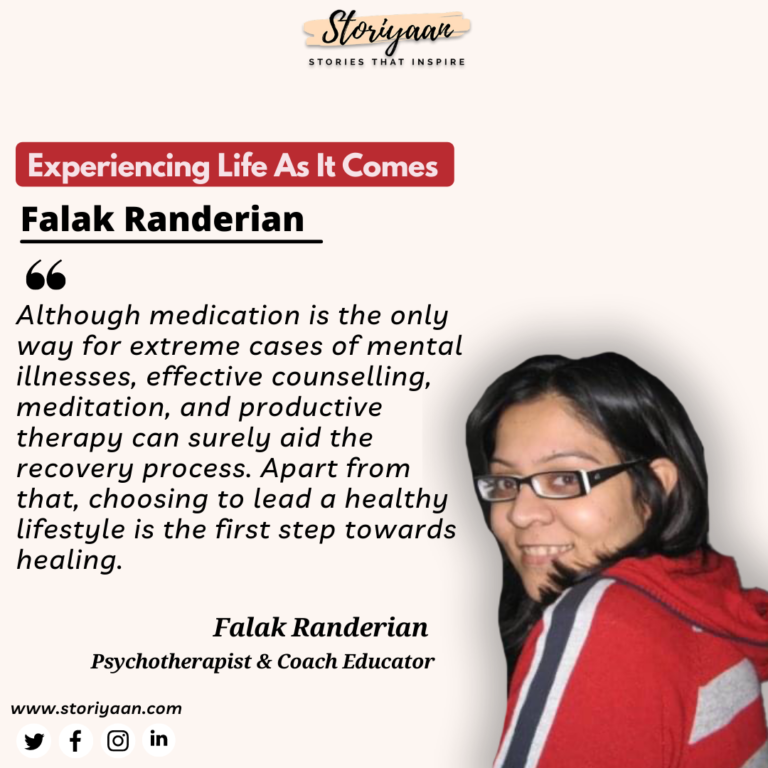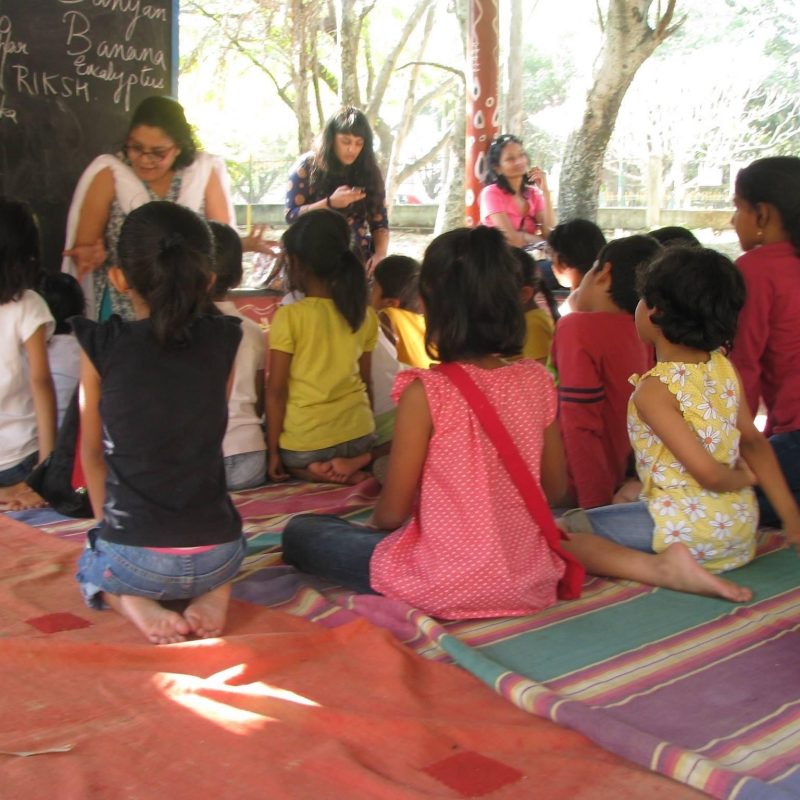Falak Randerian is the embodiment of the calm, enriching soul we all wish to become one day. A Psychotherapist and Coach Educator, she humbly considers herself ‘a learner for life’ and is a visionary for a fulfilling lifestyle. For, she has experienced the joy of living in several cities; she considers herself to be the memorabilia of each of these places.
Once a Montessori Trainee herself, today, she lovingly runs her Montessori School called “Ayelet Montessori”. Besides, specializing in ChildPsychology, Psychotherapy and Coaching, she is an ACC–ICFlevelLifeCoach and an NLPPractitioner. In her several quirks, Falak sports multiple hats both literally and figuratively!
Know more about this inspiring personality in this candid conversation with Storiyaan.

Interview
Questions and answers
In your opinion, what are the major traits that must be present in a psychotherapist to help patients unwind their insecurities?
Besides dedication and experience, empathy along with active listening skills are obligatory. Alongside, a non-judgmental outlook does the needful for making the client comfortable in discussing their insecurities.
Your preferred speciality is children when it comes to counselling. What draws you to this section in the first place?
The fundamental reason behind this speciality is highlighting the needs and requirements of children. Most problems in adulthood are a reason or cause of unshared childhood experiences. Hence, I wish to bring awareness about the healthy environments and circumstances that oil a child’s growth.
Can you tell us an incident where you had to deal with a patient with secondary trauma and what are some of the signs wherein we can detect a person is suffering from it?
The pandemic has aggravated secondary trauma and I encountered this patient who wished to help a friend who is grieving the loss of their loved ones but she was doing no better herself.
The identifiable signs include fatigue, emotional exhaustion, behavioural problems or negatively affected interpersonal relationships.
A lot of patients have shied away from medication. What are some coping methods that you suggest to a patient who does not want to be prescribed medication?
Although medication is the only way for extreme cases of mental illnesses, effective counselling, meditation and productive therapy can surely aid the recovery process. Apart from that, choosing to lead a healthy lifestyle is the first step towards healing.
With the advent of the pandemic, the entire world seems to have adopted the digital platform. What is your opinion on virtual therapy and how does it differ from in-person therapy?
Virtual therapy is the need of the hour, it also helps a patient open up and be more comfortable since they are getting consultations from the comfort of their homes. However, physical therapy is more efficient when it comes to building a rapport with the client than their virtual counterparts.
Can you elaborate on the concept of gender-equal parenting and how can it help new parents in parenting their children?
Gender-Equal parenting emphasizes parenting without implementing gender stereotypes. For example, a boy who loves cooking and a girl who likes cars should be equally encouraged. I have exclusively written about it in my book and advised new parents to choose gender-neutral parenting to avoid gender disparities of the children in the future.
What are some of the common misconceptions that your clients have regarding therapy before they join and what lies at the root of these misconceptions?
The portrayal of therapy in media and popular culture is largely incorrect. Along with that, the misconceptions like therapy is addictive, works like magic or we are in this only for the money are abounding.
The root cause behind such misconceptions is the lack of awareness and conversation regarding mental health. The fact that mental health is taboo and remains largely unaddressed also contributes to the said problems.
As a therapist, you are exposed to the darkest corners of your patient’s mind sometimes which can also be disturbing. How do you manage to empathize with them and how do such sessions impact you mentally?
With experience, we learn to detach ourselves mindfully and consciously. A good councilor will never take the session home with them. And I believe that meditation has helped me through any exhausting sessions and I also wash my hands and face with cold water after any strenuous session which has a calming effect.
A lot of patients have been victims of improper treatments and medication that have harmed their mental and physical health. What would you opine in such cases and what do such instances say about the situation of psychotherapy in the country?
There are a couple of therapists who are not registered to prescribe medicines but they do so illegally. In India, there is no specific license to be a therapist and the lack of accountability further makes matters worse. One should conduct thorough research of the therapist’s qualifications and experience before consulting them.
How would you advise students who are studying for their bachelor’s in psychology and wish to pursue the profession further?
My advice will be to stay focused on your area of interest. Be invested and receive exposure through internships and practical work. The initial years might be difficult but take time and understand your niche.
Quick 5
- First in the office or the last to leave? First in the office
- The first step to self-love – Self-acceptance
- One piece of advice for over-thinkers? Take it one day at a time
- Your favorite hat? A patchwork hat
- One healthy habit that can help–Focusing on self-actualization

The Story of Hair Care Revolution with Traya
From Struggles to Solutions: There’s Hope For Hair with Traya Hair carries emotions, memories, and stories—of the entangled fingers of loved ones, the tug of

